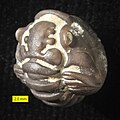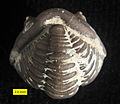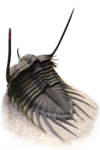Flexicalymene
| Flexicalymene Temporal range:
| |
|---|---|

| |
| Flexicalymene caractaci (Salter, 1865) from the Caradoc Series of Shropshire, England. | |
| Scientific classification | |
| Domain: | Eukaryota |
| Kingdom: | Animalia |
| Phylum: | Arthropoda |
| Class: | †Trilobita |
| Order: | †Phacopida |
| Family: | †Calymenidae |
| Genus: | †Flexicalymene Shirly, 1936 |
| Species | |
|
See text | |

Flexicalymene Shirley, 1936. [1] is a genus of trilobites belonging to the order Phacopida, suborder Calymenina and Family Calymenidae. Flexicalymene specimens can be mistaken for Calymene, Gravicalymene, Diacalymene and a few other Calymenina genera. They are used as an index fossil in the Ordovician. Ohio and North America are particularly known for being rich with Flexicalymene fossils.
Diagnosis
"Glabella parabolic to bell-shaped in outline, with three or four lateral lobes and furrows. Lacks buttress(es) from fixed cheek to lateral glabellar lobe(s). Does not have preglabellar field. No distinct crescentic area outside lateral lobe l p. Facial sutures gonatoparian (exceptionally, can be proparian in Flexicalymene). Genal spines absent. Hypostome without discrete protuberance on anterior lobe of median body." (Siveter, 1976, p.353)[2]
Type species
- Flexicalymene caractaci (Salter, 1865). By original designation and by monotypy, Calymene blumenbachii var. Caractaci Salter, 1865 from the Marshbrookian, Dalmanella unguis Biozone (Caradoc Series) of Marshwood Quarry, near Marshbrook, Shropshire, England.[3]
Other species
- Flexicalymene cambrensis (Salter, 1865), from the Lower Llandeilo Group of Llan Mill, near Narberth, Dyfed, Wales.
- Flexicalymene acantha Bancroft, 1949,[4][5] from the Harnage Shale Formation (Harnagian Stage), near Horderley, Shropshire, England.[6]
- Flexicalymene incerta Barrande, 1852,[7] Found only at Lower part of wooded slope above railroad facing Přeštínská Railway Station (Ordovician of Czech Republic). Assigned by Dean (1963).
- Flexicalymene planimarginata (Reed, 1906), from the Lower Longvillian (Caradoc Series) of Ynys Galed, 4 km west of Dolbenmaen, Gwynedd, Wales.[8]
- Flexicalymene cavei Price, 1974, from a Cautleyan marine limestone in the Sholeshook Formation of Moldin, near Llanddowror, Carmarthenshire, Wales.[9]
- Flexicalymene shirleyi Tripp, 1954. From mudstone in the Ardwell Group, Balclatchie Formation (Caradoc Series) of Craighead Quarry near Girvan, Ayrshire, Scotland.[10]
- Flexicalymene scotica Lamont, (1949, p. 315, P1. 18, figs. 6, 7), uppermost Ordovician (Hirnantian), Girvan, Ayrshire, Scotland.[11]
- Flexicalymene verecunda Dean, 1979. From limestone/shale on unsurfaced road leading from Lourdes to Clam Bank Cove in the Long Point Group (Ordovician) and Winterhouse Formation, Port au Port Peninsula, southwestern Newfoundland, Canada.[12]
- Flexicalymene croneisi Roy, 1941. Upper Ordovician, Baffin Island, (Ontario).[13]
- Flexicalymene meeki Foerste, 1910. [14] From the Ordovician of Ontario and Quebec in Canada and, Indiana, Kentucky, Michigan, Ohio and Tennessee in the USA.
- Flexicalymene retrorsa Foerste, 1910. Type locality is half a mile above the mouth of Silver creek, east of Dunlapsville, Late Ordovician (Richmondian) Waynesville Formation of Indiana. The species is also recorded from Quebec, Canada and Ohio, Kentucky USA.
- Flexicalymene granulosa (Ohio, Kentucky and Quebec).
- Flexicalymene senaria Conrad, 1841.[15] From the Ordovician of Canada (Ontario, Quebec, Québec), Sweden, United States (Illinois, Iowa, Michigan, Minnesota, Missouri, New York, Tennessee and Virginia.
- Flexicalymene ouzregui Ordovician, Morocco.
- Flexicalymene tazarensis Ordovician, Morocco.
Gallery
-
Flexicalymene meeki; Waynesville Formation; Upper Ordovician; Caesar Creek, Ohio.
-
Flexicalymene meeki; Waynesville Formation; Upper Ordovician; Caesar Creek, Ohio.
-
F. meeki
-
Flexicalymene species on display at State Museum of Pennsylvania. Specimen is approximately 3 cm long
-
Rolled F. ouzregui
References
- ^ SHIRLEY, J. 1936. Some British trilobites of the family Calymenidae. Quarterly Journal of the Geological Society of London 92, 384 - 421.
- ^ SIVETER, D. J. 1976 The Middle Ordovician of the Oslo Region, Norway. 27. Trilobites of the family Calymenidae. Norsk Geologisk Tidsskrift, Vol. 56, pp. 335 - 396. Oslo.
- ^ SALTER, J. W. 1865. A monograph of the British trilobites from the Cambrian, Silurian and Devonian formations. Monograph of the Palaeontographical Society, 81 - 128, pls. 17 - 14.
- ^ BANCROFT, B. B. 1949. Upper Ordovician trilobites of zonal value in south-east Shropshire (Edited by A. Lamont). Proc. R. Soc. (B), 136, pp. 291 - 315, pls. 9 - 11.
- ^ LAMONT, A. 1946. Mr. B. B. Bancroft. Nature 157, p. 42. https://rdcu.be/cfPbu
- ^ DEAN, W. T. 1963. The Ordovician trilobite faunas of South Shropshire, III; British Mus. Nat. History Bull., Geology, v. 7, no. 8, p. 216 , pl. 37, figs. 1, 3 - 6, 14.
- ^ BARRANDE, J. 1852. Systême silurien du centre de la Bohême: lère partie, Crustacés: Trilobites. 935 pp. Privately published, Prague & Paris.
- ^ REED, F. R. C. 1906. The Lower Palaeozoic trilobites of the Girvan district, Ayrshire. Part 3. Monographs of the Palaeontographical Society, pp. 97 - 186, pls. 14 - 20.
- ^ PRICE, D. 1974. Trilobites from the Sholeshook Limestone (Ashgill) of South Wales. Palaeontology 17 (4): pp. 841 - 868.
- ^ TRIPP, R. P. 1954. Caradocian trilobites from the mudstones at Craighead Quarry, near Girvan, Ayrshire. Transactions of the Royal Society of Edinburgh 62 (3): 655 - 693.
- ^ OWEN, A. W. 1986. The uppermost Ordovician (Hirnantian) trilobites of Girvan, SW Scotland with a review of coeval trilobite faunas. Transactions of the Royal Society of Edinburgh 77: 231 - 239.
- ^ DEAN, W. T. 1979. Trilobites from the Long Point Group (Ordovician), Port au Port Peninsula, southwestern Newfoundland. Geological Survey of Canada Bulletin 290: pp. 1 - 53.
- ^ ROY, S. K. 1941. The Upper Ordovician fauna of Frobisher Bay, Baffin Island. Field Museum of Natural History. Geology, Memoirs 2: 1 - 212.
- ^ FOERSTE, A. F. 1910. Preliminary notes on Cincinnatian and Lexington fossils of Ohio, Indiana, Kentucky, Pennsylvania, and Tennessee. Bulletin of the Scientific Laboratories of Denison University 16 (1): pp. 17 - 100.
- ^ CONRAD, T. A. 1841. Fifth annual report on the paleontology of the state of New York. New York Geological Survey, Annual Report 5: pp. 25 - 57
External links






